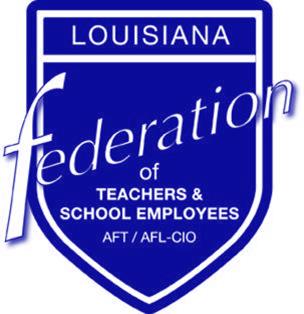Louisiana Federation of Teachers
Weekly Legislative Digest
April 25, 2014
Steve Monaghan, President * Les Landon, Editor
2014 Regular Legislative Session
Now available on the Web at http://la.aft.org
Check out all things legislative on the LFT’s Legislative Resource Page!
URGENT teleconference about our future
Issues that could change our future will be discussed on a Tele-townhall conference Monday, April 28 at 5:30 P.M.
LFT President Steve Monaghan and Legislative Director Mary-Patricia Wray will be there to discuss some bills that could silence the voices of teachers and school employees, and other bills that will have a dramatic effect on retiree income.
Please call (855)-756-7520 Ext.24667# at 5:30 P.M. Monday to learn more and to take action!
Tele-townhall topic: Your payroll choice will be on the line next Wednesday!
Three bills are expected to be heard by the House Labor and Industrial Relations Committee on April 30. In an effort to silence the Louisiana Federation of Teachers and other public sector unions, these bills will strike at our source of funding.
HB 172 by Rep. Kirk Talbot (R-River Ridge), HB 451 by Rep. Alan Seabaugh (R-Shreveport) and HB 1059, also by Rep. Talbot would prohibit public sector unions from collecting member dues through payroll deduction. They are an effort to silence any voice of opposition.
The right of union members to pay their dues through payroll deduction is neither a special privilege nor a burden on taxpayers. It is a service that is available to credit unions, insurance companies and other recognized vendors, as well as unions.
Freedom of speech and freedom of association are crucial to a representative form of government. Prohibiting the payroll deduction of union dues would stifle those freedoms and ultimately weaken our democracy.
Tele-townhall topic: Bills would help, hurt retiree income
Bills are under consideration that would provide much-needed Cost of Living Adjustments for retired public servants, including teachers and school employees.
Another would make it very difficult to grant COLAs in the future.
One package of bills is aimed at funding COLAs from the experience accounts of retirement systems for teachers, school employees, state employees and state police. The increases amount to a bit less than $30 per month for each retiree.
The bills, SB 16, SB 18, SB 19 and SB 21, are all authored by the chair of the Senate Retirement Committee, Sen. Elbert Guillory (R-Opelousas). Because of the way Sen. Guillory linked the fates of the four bills, all of them must pass in order for any of the retirees to get a COLA.
The other bill, HB 1225 by Rep. Joel Robideaux (R-Lafayette) would make it difficult, if not impossible, for the four major state retirement systems to provide beneficiaries with cost-of-living increases in the future.
Learn more about these important issues, and what YOU can do, at the LFT Tele-townhall on Monday afternoon at 5:30 P.M. Just call(855)-756-7520 Ext.24667# at 5:30 P.M. Monday to participate.
Panel okays agreement on teacher due process
Without opposition, an agreement to change the way teachers are disciplined and dismissed under Act 1 of 2012 was approved by the House Education Committee and sent to the House floor for a vote.
HB 987 by Rep. Jeff Thompson (R-Bossier City) is the result of hours of negotiations between the Jindal administration, the LFT and other organizations including the LAE, A+PEL, school board, principals and superintendents.
While the bill is limited to sections of Act 1 that deal with the discipline and dismissal of teachers, LFT President Steve Monaghan said it is a good first step toward bringing education reforms in line with teacher expectations.
The bill would replace several sections of law that virtually abolished the due process rights of teachers who were labeled as ineffective under Act 1. No longer would the superintendent have the sole final word on dismissal of teachers. Termination decisions would be reviewed by a hearing officer chosen from a list of qualified persons selected by the school board.
Unlike Act 1’s provision, in which a three-person panel’s recommendation is not binding, the hearing officer may overrule a superintendent’s decision. The bill includes a number of other revisions aimed at making sections of Act 1 into a clearer, fairer process.
Not only did the bill win unanimous approval from the committee, no cards of opposition were entered at the hearing – an indication that the governor’s office has signaled his allies that this bill has his full support.
Bill to review Value Added Model wins approval
A bill that would subject the controversial Value Added Model of teacher evaluation to serious review was unanimously approved by the House Education Committee.
HB 415 by Rep. Frank Hoffman (R-West Monroe) would empower a committee to study VAM and ensure that it is a fair and accurate evaluation tool before it is re-implemented in 2015.
Last fall the Board of Elementary and Secondary Education suspended use of VAM because of concerns about its accuracy.
Rep. Hoffman, the author of the law creating the Value Added Model, said he still believes in the concept, but must be assured that it is accurate. He noted that in one Monroe elementary school, all five fourth grade teachers were rated ineffective by VAM.
“The odds against that are 100,000 to one,” he said.
Rep. Hoffman said that some schools with “A” grades have a high number of “Ineffective” rated teachers, while some graded “D” or “F” by the state have a large number of “Highly Effective” rated teachers.
“Let us bring back a system that reconciles these differences,” he said.
The bill will convene an existing subcommittee of the accountability commission, including six classroom teachers and a member of the House and Senate. The committee will be expected to issue a report 60 days prior to the start of the 2015 school year.
LFT Legislative Director Mary-Patricia Wray said the bill is a step toward making the COMPASS evaluation system fair and accurate. Still to be done, she said, is an evaluation of the way a second quantitative evaluation program, Student Learning Targets, and has been implemented in the state.
A second instrument aimed at making the evaluation process more fair failed on a tie vote.
HCR 2 by Rep. Vincent Pierre (D-Lafayette) would have changed a BESE rule that conflicts with the intent of Act 54 of 2010, which established the state evaluation program.
When lawmakers adopted Act 54, they required 50% of a teacher’s evaluation to be based on a quantitative score such as the Value Added Model or Student Learning Target, and 50% on a qualitative evaluation or observation.
BESE’s rule, however, says that a teacher ruled “Ineffective” on either half is automatically judged “Ineffective.” A teacher who gets a high quantitative score and a low qualitative score could be judged “Ineffective,” even though the teacher’s score average would be “Effective.”
When the resolution came to a vote, the committee tied 8-8, and it failed to pass.
Plan to lessen impact of unexcused absences proceeds
A bill that would prohibit including the test scores of habitually absent students in teacher evaluations was unanimously approved by the House Education Committee.
If HB 533 by Rep. Alan Seabaugh (R-Shreveport) becomes law, the test scores of students who have 10 or more unexcused absences in a semester could not be counted as part of a teacher’s evaluation.
LFT Legislative Director Mary-Patricia Wray, who supported the bill, said the proposal would have no effect next year because the Value Added Model has been suspended. She said a need remains to review the way Student Learning Targets are processed at the local level.
House kills attack on union staff
A bill that would prevent future employees of the Louisiana Federation of Teachers and three other organizations from participating in the Teachers’ Retirement System of Louisiana was killed by the House of Representatives.
HB 45 by Rep. Alan Seabaugh (R-Shreveport) was one of two bills facing the House that would prohibit future staff members of the LFT, the Louisiana Association of Educators, the Associated Professional Educators of Louisiana and the Louisiana Resource Center for Educators from becoming members of TRSL.
Rep. Seabaugh’s bill died on a 44-50 vote on the House floor. A similar bill, HB 25 by Rep. Kirk Talbot (R-River Ridge), awaits floor action. Under Rep. Talbot’s bill, current staff members of those organizations would not be allowed to remain members of TRSL.
Under current law, teachers and school employees who go to work for the organizations retain their membership in the retirement system. That is a longstanding courtesy for retirement system employees.
Bill defining teacher status approved
A bill that defines several levels of teachers in order to provide appropriate professional development was approved by the House Education Committee.
HB 1129 by Rep. Ledricka Thierry (D-Opelousas) would create new categories of teachers called Transfer Teachers, Novice Teachers, Emerging Teachers, Provisional Teachers, Professional Teachers and Master Teachers.
As originally proposed, the new law would be very expensive to implement, and could be considered an unfunded mandate on school systems. An amendment was added making implementation voluntary by local school districts. The amended version was approved by 10-6.
Planning time bill fails in committee
A resolution that would have guaranteed teacher planning time would not be diverted to other uses such as staff meetings failed in the House Education Committee
HCR 46 by Rep. Barbara Norton (D-Shreveport) would have required schools to ensure that the 45 minutes of daily planning time already provided by law is not encroached upon.
Red River United President Jackie Lansdale said that the resolution simply specifies what may be considered planning time. Teachers need the time to prepare lessons, grade papers and tend to reporting requirements. Mandatory staff meetings encroach on teacher planning time, she said.
The resolution was opposed by principals and the Department of Education. It failed on a 60-7 vote.
House kills bill to elect state superintendent of education
A bill asking for a constitutional amendment to elect the state superintendent of education was roundly defeated by the House of Representatives.
HB 125 by Rep. Joe Harrison (R-Gray) would have called for an election allowing voters to change the state constitution to choose the state superintendent by ballot. The bill, which would have required a two-thirds majority to pass, failed by 40-56.
A second bill asking for an elected superintendent, HB 127, remains on the calendar. It is also authored by Rep. Harrison.
Senate returns Baton Rouge restructuring bill to calendar
After winning unanimous approval in the Senate Education Committee, a plan to restructure the East Baton Rouge Parish School Board was returned to the calendar by the full Senate.
SB 636 by Sen. Bodi White (R-Central) would create new community school councils and give principals greater authority over personnel decisions, as well as contracting for a range of services.
A mirror image of the bill, HB 1177 by Rep. Steve Carter (R-Baton Rouge) was the subject of hours of acrimonious testimony in the House Education Committee last week, and was voluntarily deferred by the author.
Teacher arrest bill passes House
An LFT-sponsored bill plan to prevent the arrest of teachers at school for minor offenses passed the House of Representatives on an 89-0 vote.
HB 1108 by Rep. Terry Landry (D-New Iberia) would require issuance of a misdemeanor summons “for any misdemeanor act allegedly committed during the course and scope of the school employee’s employment.”
The employee would be required to answer a summons and appear in court on the charges. The bill does not apply to serious offenses or injuries to students.
The bill now moves to the Senate for further action.
Amendment would protect higher ed funding
A proposed Constitutional amendment that would prohibit the supplanting of state funds with tuition and fee increases was unanimously approved by the House Appropriations Committee.
HB 222 by Rep. Walt Leger (D-New Orleans) is a response to criticism of budgets proposed by the Jindal administration over the past several years. The governor has cut state funding, but allowed raises in tuition and fees at state colleges and universities. Budget hawks in the legislature consider those to be tax increases on students and their families.
Retirement bills proceed
Two bills that would provide cost of living adjustments to retired teachers and school employees, SB 21 and SB 19 by Sen. Elbert Guillory (R-Opelousas) were approved without objection by the House Retirement Committee. LFT supports these bills.
The union does not support a separate bill, HB 1225 by Rep. Joel Robideaux, which would make it more difficult to put money into the experience accounts that pay for COLAs. Unfortunately, it is linked to the four bills that would provide COLAS for all public employee retirement system members. If the bill does not pass, neither will the COLAs. The bill was also approved without objection by the committee.
Committee considers BESE bills
A bill that would make BESE members more accountable to the public was approved by the House and Governmental Affairs Committee.
HB 277 by Rep, Bret Geymann (R-Lake Charles) would define and prohibit conflicts of interest among BESE members, the superintendent and their immediate families. It would increase reporting requirements to the Louisiana Ethics Board. It would prohibit their involvement in employment or contracts undertaken because of or as a result of their role as a BESE member, under which they would incur a substantial benefit.
A separate bill by Rep. Geymann, HB 374, would have made all BESE seats elected positions. Currently, eight members are elected from districts and three are appointed by the governor. The bill was involuntarily deferred by the committee.
The committee also considered HB 870 by Rep. Dee Richard (I-Thibodaux), which would have prevented charter school management boards from contracting management and operational services to third parties. The bill, which had the support of LFT, was voluntarily deferred by its author.
Senate panel defers education bills
The Senate Education Committee has become known as the place where education bills go to die. Here is a rundown of this week’s obituaries:
SB 175 by Rep. Karen Carter Peterson (D-New Orleans) would have repealed the Louisiana Science Education Act, widely believed to be a side door for the teaching of creationism in public schools. For the fourth year in a row, this effort to repeal the act was defeated.
SB 219 by Sen. Edwin Murray (D-New Orleans) would have streamlined the process by which unused Recovery School District properties are returned to the original public school system. Sen. Murray voluntarily deferred his bill because the Orleans Parish School Board is working on an agreement with RSD to deal with Orleans Parish properties. Eventually, he said, a bill will have to be revisited in other parishes where the RSD operates.
SB 225 by Sen. Murray was intended to stop the practice by which charter school operators use complicated schemes to lease property from “sister companies” above fair market value using public education funds. The money, Sen. Murray said, should be used to educate children, not enrich corporations. The bill was involuntarily deferred.
Health care and employment bills considered
Several bills dealing with health care and employment issues were heard by committees.LFT supported the bills.
SB 96 by Sen. Ben Nevers (D-Bogalusa) is a constitutional amendment that would expand Medicaid in Louisiana to cover nearly 400,000 uninsured citizens, bringing $15 billion in federal funds to Louisiana over the next ten years. LFT supported the bill. It was deferred by a vote of 6-2 by the Senate Health and Welfare Committee.
SB 322 by Sen. Ed Murray (D-New Orleans) would create a mechanism for reporting violations of equal pay laws and enforcement of those laws. LFT supports this bill. It was recommended favorably by the Senate and Governmental Affairs Committee.
SB 443 by Sen. Murray would apply the provisions of the Equal Pay Act to political subdivisions and local governments. LFT supports this bill. It was recommended favorably by the Senate and Governmental Affairs Committee.
SB 334 by Karen Carter Peterson would apply the provisions of the Equal Pay Act to private employers and government contractors. LFT supports this bill. It was recommended favorably by the Senate and Governmental Affairs Committee.
SB 501 by Sen. Wesley Bishop (D-New Orleans) would allow 16 year olds to complete early voter registration. LFT supports this bill. It was recommended favorably by the Senate and Governmental Affairs Committee.
The House Labor and Industrial Relations Committee heard HB 658 by Rep. Barbara Norton (D-Shreveport) and HB 956 by Rep. Julie Stokes (R-Kenner) and Sen. Sherri Buffington (R-Keithville), dealing with equal pay for women. Rep. Norton’s bill failed in a 9-5 vote and Rep. Stokes bill was amended to exempt cases of underpayment to women when such underpayment is not “intentional.” HB 956 was passed out of committee.
Two minimum wage increase bills were heard by the Senate Labor Committee. SB 123 by Sen. Ben Nevers (D-Bogalusa) was involuntarily voluntarily deferred. SB 46 by Sen. Yvonne Dorsey-Colomb was voluntarily deferred and will be heard again next week.
The week ahead
Monday, April 28
House Floor:
HB 1178 by Rep. Dalton Honore (D-Baton Rouge) would decrease the number of members on the EBR school board to 7, thereby disenfranchising voters. LFT opposes this bill.
HB 703 by Rep. John Bel Edwards (D-Amite) would prevent BESE from overturning the decision of a local school board that rejects a charter school application. LFT supports this bill.
HB 127 by Rep. Joe Harrison (R-Gray) would make the State Superintendent position elected. LFT supports this bill.
House Appropriations Committee:
HB 380 by Rep. Bret Geymann (R-Lake Charles) would prohibit the use of state funds for PARCC without legislative authority. LFT is monitoring this bill.
House Civil Law Committee:
HB 222 by Rep. Walt Leger (D-New Orleans) would prohibit supplanting state higher education dollars with tuition and fees. LFT supports this bill.
Senate Finance Committee:
SB 548 by Sen. Sharon Weston-Broome (D-Baton Rouge) would require verification of equal pay practices in public contracts. LFT supports this bill.
Senate Retirement Committee:
HB 6 by Rep. Kevin Pearson (R-Slidell) would increase the employer contribution for higher education members in the optional retirement plan on a graduated plan. LFT supports this bill.
Tuesday, April 29
House Floor:
HB 533 by Rep. Alan Seabaugh (R-Shreveport) would eliminate the data of students who have 10 or more unexcused absences from being used in calculation of VAM scores. LFT supports this bill and is working to include excused absences as an invalidating factor for student absences as well.
House Education Committee:
HB 953 by Rep. Walt Leger (D-New Orleans) will be heard. The bill will be amended to provide for another year of delay on implementation of PARCC. LFT is monitoring this bill.
HB 993 by Rep. John Schroder (R-Covington) would create a single diploma track with multiple endorsements in order to ensure that student with exceptionalities earn a meaningful, appropriate high school diploma.
HB 995 by Rep. Alfred Williams (D-Baton Rouge) would replace COMPASS with a system of teacher evaluations based on multiple measures. LFT supports this bill.
HB1172 by Rep. Wesley Bishop (D-New Orleans) would provide for a graduated increase in due process rights based on experience. LFT is monitoring this bill.
HB 1208 by Rep. Vincent Pierre (D-Lafayette) would require charter schools to provide transportation for students attending their schools, in certain parishes. The bill will be amended to clarify that the cost of transportation shall be the responsibility of the charter school, not of the local school system. LFT supports this bill with proposed amendments.
Wednesday, April 30
House Education Committee:
HB359 by Rep. Joe Harrison (R-Gray) would pause the current letter grade component of the district accountability system. LFT supports this bill.
HB 735 by Rep. Ted James (D-Baton Rouge) would improve upon the “reverse parent trigger” law passed last session to allow more parents to participate in the process of returning failing RSD schools to control of the local school board. This is part of LFT’s package of bills.
HB 982 by Rep. Randal Gaines (D-LaPlace) would revise discipline and termination procedures for teachers to include arbitration. LFT is monitoring this bill.
Correction
An article in last week’s Legislative Digest incorrectly quoted a witness testifying on behalf of HB 703 by Rep. John Bel Edwards in the House Education Committee. Here is a corrected version:
A witnesses from Lafayette told the panel that after their school board rejected charter applications BESE overruled the local officials, and the system lost $7 million in MFP funds as a result.
“It is with a heavy heart,” she said, “that I’ve come to believe the Department of Education does not want public education to succeed in my parish.”








